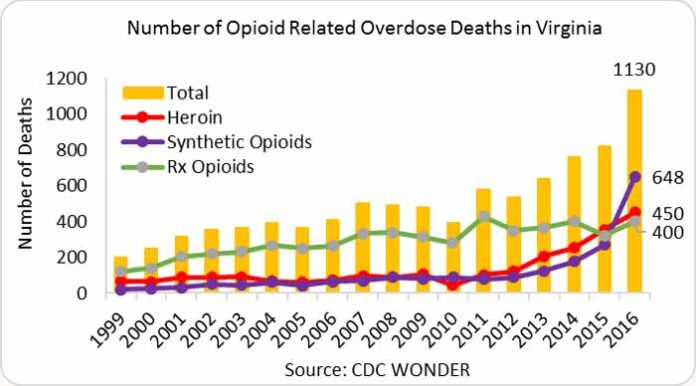Virginia’s Framework for Addiction Analysis and Community Transformation (FAACT), a data-sharing platform designed to help the Commonwealth fight the opioid crisis, will expand to the Roanoke Valley and continue operating in the Northern Shenandoah Valley.
FAACT began in 2017 as a collaboration between the Virginia Departments of Criminal Justice Services (DCJS) and Behavioral Health and Developmental Services (DBHDS) to develop and implement a platform to share data across government agencies and local organizations.
The platform was initially funded by a federal Technology Innovation for Public Safety (TIPS) grant from the U.S. Department of Justice Bureau of Justice Assistance. During the two-year grant, DCJS contracted with Qlarion Inc., to develop the FAACT platform and deploy a pilot project in the Northern Shenandoah Valley. FACCT has been successfully operating and providing stakeholders with opioid-use data in this region since December 2018.
Based on the success of the initiative in the Northern Shenandoah Valley, the platform is being expanded to the Roanoke Valley, which saw opioid-related deaths quadruple between 2016 and 2017. Qlarion, Inc. will be working closely with the Roanoke Valley Collective Response to ensure that Roanoke’s critical partners are engaged.
“The data provided by this platform will help us get to evidence-based solutions faster, with greater assurance that services are tailored to our community culture and needs,” said Kimberly Horn, Co-Chair of the Roanoke Valley Collective Response and professor and scientist at the Virginia Tech-Carilion Fralin Biomedical Research Institute.
“Access to the FAACT system will allow our region to share information and coordinate our response,” said Nancy Hans, Co-Chair of the Roanoke Valley Collective Response and Executive Director of the Prevention Council of Roanoke. “This will enhance our abilities and understanding of what is happening in our community, and enable us to better address the issues we’re seeing.”
“As a Commonwealth, we must be strategic and proactive in helping individuals struggling with addiction and addressing the opioid crisis in our communities,” said Governor Ralph Northam. “As a physician, I know that we cannot defeat this epidemic in isolation. With the expansion of this platform, we will enable more of our government agencies and local organizations to share important data and improve their ability to work together to translate that information into real solutions that can save lives.”
The secure data-sharing platform has combined formerly separate data sets from across a variety of different government agencies, law enforcement agencies, and local organizations—including healthcare and social services, public safety and corrections, drug courts, and community coalitions—to generate insights about the contributing factors to opioid abuse and the most effective ways for communities to respond.
“Everyone has long been in agreement that we cannot arrest our way out of the opioid crisis,” said Secretary of Public Safety and Homeland Security Brian J. Moran. “These collaborative efforts provide valuable insight that supports a targeted, evidence-based response to the epidemic, which claims the lives of over 1,000 Virginians each year.”
FAACT enables users at the state and local level to use empirical data to proactively address the opioid crisis. A self-service analytics layer allows the participating organizations to create reports and dashboards, look at incident maps, and more effectively collaborate with each other.
“We launched the platform in the Winchester region nine months ago,” said Lauren Cummings, Executive Director of the Northern Shenandoah Valley Substance Abuse Council. “Based on the collective analysis of the platform, we have gained incredible insight, like when our area has experienced a spike in overdoses, and in turn we have been able to deploy resources and make key adjustments to prevent further harm.”
“We’re already seeing the benefits that come from combining data sets to focus our efforts,” said Carlos Rivero, Chief Data Officer for the Commonwealth of Virginia. “With Qlarion and other technology partners, we are well on our way to creating a data-sharing and analytics platform for the entire Commonwealth.”
“Qlarion is working hand-in-hand with the Commonwealth and community leaders to understand the gaps in their data,” said Jake Bittner, CEO of Qlarion, Inc. “Through this process we can help to integrate data sets, the analysis of which provides users with previously unavailable information.”
“As additional regions of the Commonwealth join the platform, we’ll have a more holistic view about both opioid addiction and effective treatment plans across the state,” said DCJS Director Shannon Dion. “This information will not only enable us to disperse funding more effectively, but also direct our technical assistance to the areas that need it the most.”
“By expanding our efforts into additional areas of the Commonwealth and continuing to broaden our knowledge about causal factors, we can help more Virginians access critical and potentially life-saving treatment,” said Acting DBHDS Commissioner Mira Signer.
The continuation and expansion of this initiative is funded through a federal State Opioid Response grant from the U.S. Substance Abuse and Mental Health Services Administration (SAMHSA). These federal grants are designed to help states fight the opioid epidemic through the provision of prevention, treatment, and recovery activities for opioid use disorder.

